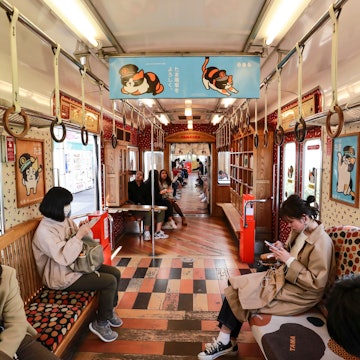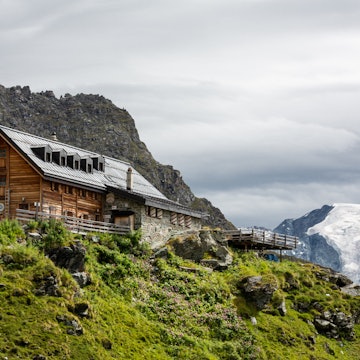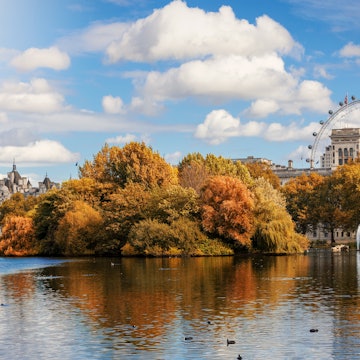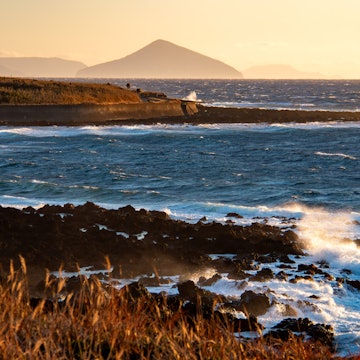
Ask LP: What's a more authentic travel experience, a hotel or Airbnb?

Feb 8, 2021 • 4 min read

How important is your accommodation in having an authentic travel experience? © Kris Davidson / Lonely Planet
Many of us are looking for authenticity when we travel, to feel like we’re really getting to know a place and its people. Lots of companies try to sell this authenticity to us, particularly for accommodation, as John Walton explores.
Quick, think back to a memory of traveling, one when you really felt like you were immersed in a place. Where are you? Me, I’m in Japan, grilling delicious, freshly caught scallops on a tabletop grill in a small, seaside wooden shack restaurant on Hokkaido’s remote Shiretoko peninsula before tucking into a donburi bowl of sea urchin and crab over rice. Absolutely delicious, and surrounded by Japanese people doing exactly the same thing.
But was it authentic? The restaurant, Jun no Banya, is actually drawn from a Japanese TV show, From the Northern Country, hence why it was filled with Japanese fans of the show (or perhaps just enjoying the seafood). So, despite the fishing floats, nets and all, perhaps not so 'authentic'?
To the contrary, I say. I consider visiting a restaurant that Japanese people travel for hours to visit absolutely authentic: traveling like a local is, to my mind, part of the joy of traveling.

It’s the same with accommodation. In Japan, for example, travelers to the country will almost certainly have seen the hotels belonging to the Toyoko Inn chain, almost always multi-tone beige prefab buildings with neon blue titles near train stations, business districts and even airports.
Business hotels
These are called “business hotels” in Japan, and are some of the very cheapest kind of accommodations: often under US$50 a night outside Tokyo for your own room with your own bathroom, solid wi-fi, a hearty breakfast included, and direct control of your own AC/heating unit. It may be very consistent, but it’s very Japanese, all the way down to the bidet lavatory and deep bath.
But even in these very similar hotels, I’ve had many very memorable — and I dare say authentically modern Japanese — experiences. I’ll always remember sharing a table for a complimentary curry dinner at one the chain’s hotels in rural Hiroshima Prefecture, and having an absolute whale of a time watching the sumo with some increasingly inebriated Japanese businessmen. Between Google Translate on my iPhone, some basic Japanese phrases and their school-level English, we tried very hard to empty the hotel’s vending machine of beer.

Is this somehow not “authentic” Japan, or authentically Japanese? Is it less Japanese than, say, a $500/night traditional ryokan with tatami floors and futon to sleep on, or a Kyoto machiya shophouse rented out via an online platform? What about a city apartment furnished from Ikea?
Airbnb and other platforms for vacation rentals or holiday lets love to claim that their products are more “authentic” than hotels. But as regular travelers know, it’s all too easy for accommodations rented over these platforms to end up looking generic and bland. And accommodation overconcentration in some neighborhoods can destroy the very authenticity they claim to provide.
Airbnbization
You can have very different experiences in a western-branded hotel in another country than in a locally-branded hotel. Similarly, the "Airbnbization" of design means that you can rent apartments with a very similar aesthetic in Marrakesh, Melbourne, Marseille, Morioka, Montevideo or Miami, right down to the same furniture.
I’ve had some great, authentic local experiences when renting an entire place: in Perth I stayed at a eucalyptus-brushed hillside holiday annex with the most stunning balcony views looking west over the city at sunset, with the owner inviting me for a couple of evenings’ quaffing of delicious local wines.

The key to authenticity is people, both in the positive and negative way. On the positive side, travel means that we can meet and get to know people whose life experiences differ to our own, and learn new things about the world and ourselves. On the negative side, mass tourism can often sap a place of its soul and of the people who live there. One has only to look at the problems created in many cities from housing being turned into holiday rentals, or at the effect of high-impact, low-value tourism like hen or stag (bachelor/ette) parties on city centers and their non-party nighttime economies, even before platform-based apartment rentals were widespread.
B&B
So how do you find something authentic? If that’s what I’m after, I love a good homestay or an old-school bed-and-breakfast. Even before I lived in France, staying at chambres d’hôtes — the sort of French version of a B&B, often with dinner around the host’s table too — was a delightful way to immerse myself in French culture. On my very first trip to Tokyo I stayed in the guest bedroom of a lovely former flight attendant out in the suburbs who introduced me to everything from how the trains in Tokyo work to shabu-shabu hotpot.
Authenticity is about connecting with people. And, if that’s something that you want to do, you can do that in many different kinds of accommodations.
You might also like:
The places travellers are searching to go in 2021, according to Airbnb
Ask LP: what’s the safer option - a hotel or an Airbnb?
Ask LP: What's a good destination in France that offers an escape from the crowds?













